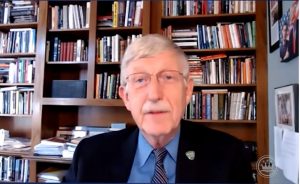
NASHVILLE (BP) – The unprecedented pace of developing vaccines for COVID-19 has not jeopardized their effectiveness or safety for Americans, the director of the National Institutes of Health said Thursday (Dec. 3) in a webinar hosted by the Southern Baptist Ethics & Religious Liberty Commission. Francis Collins, NIH’s director since 2009, answered questions from ERLC President Russell Moore about vaccines and other coronavirus issues.
“I want to assure you as a scientist, as a physician, as a researcher who has been in the middle of all of this since January, we have done nothing to compromise in even the smallest way the safety or the efficacy standards for these vaccines,” said Collins, a noted physician-geneticist.

Screengrab of Francis Collins speaking during a Southern Baptist Ethics & Religious Liberty Commission webinar on Dec. 3, 2020.
“What we’ve done is to figure out how to get rid of some of the dead time that normally means it takes 8 years to develop a vaccine” instead of the 10 months the current candidates have required, he said. “But the rigor involved, if anything, has been escalated to an even higher level than has been applied to vaccines before.”
Pfizer and Moderna have submitted applications to the FDA following trials that included 43,000 volunteers for the former company and 30,000 for the latter. In the past, 4,000 or 5,000 participants have been involved in vaccine trials, Collins said.
“So if the FDA in their conclusions in just a couple of weeks say these are safe and effective, that’s because the data say they are safe and effective,” he told webinar participants.
Collins and other public health officials are seeking to help persuade a large portion of the American public that is skeptical about a vaccine. A Gallup poll published Nov. 17 showed 58 percent of adults said they would get the vaccine if it were currently available at no cost.
The webinar occurred on a day when Johns Hopkins University in Baltimore reported the number of confirmed COVID-19 cases in the United States has reached nearly 14 million and almost 275,000 Americans have died.
Collins said of the Pfizer and Moderna trials, “[W]e were delighted, thrilled, amazed to see that it looked like the effectiveness [of both] was about 95 percent. That is so much better than what you could expect to see with a new illness of this sort.” The trials have lasted for at least two months, a time period in which any problem is normally recognized, he said.
“And the safety looks really good as well” Collins added, noting that so far the evidence shows the “side effects seem to be pretty similar to what you get with other vaccines, and there don’t seem to be any unexpected longer-term issues,”
A follower of Christ, Collins said, “Here’s a great opportunity for Christians to say, ‘Let’s really look at the truth of the situation and evaluate what the evidence demonstrates for and against the idea that this is something I want to take advantage of myself.’”
For now, the risk “looks minimal,” and there is “a pretty good balance of benefits and risks that you’d want to engage in and probably take advantage of yourself and roll up your sleeve,” he said.
Collins said a public meeting regarding the Pfizer vaccine will be held Dec. 10, followed a week later by an event about the Moderna vaccine. He explained that each vaccine requires two doses or injections about a month apart. About 40 million doses have already been manufactured, enabling vaccinations to begin the day after expected approval by the FDA is granted.
The first recipients of the vaccine will be higher-risk Americans, such as health-care workers and the elderly in nursing homes and assisted living facilities, Collins said.
In response to a question from Moore, Collins explained a cell line derived from an elective abortion in 1972 is used often in biotechnology but is not used in the production of the Pfizer and Moderna vaccines. The cell line is part of the preparation of the vaccine candidates produced by Johnson & Johnson and AstraZeneca that are now in Phase 3 trials.
That cell line “is sometimes used just as a lab bench experiment to make sure that everything is working the way it’s supposed to,” he said.
The Charlotte Lozier Institute – a pro-life research organization – released a chart Thursday that showed Pfizer and Moderna have used abortion-derived cells in some lab tests while not using them in developing a vaccine. The chart also showed Johnson & Johnson and AstraZeneca have used such cells in both lab tests and production of a vaccine.
Rejecting a vaccine and waiting on herd immunity is not an appropriate option, Collins told Moore.
“If we were to adopt that strategy, we potentially would eventually get to herd immunity but there would be millions of us no longer around,” he said. “That is too high a price for us to bear if we don’t have to. That’s not a Christian answer if we love our neighbor.”
Action Until Vaccines are Ready
While Americans await a vaccine, Collins said, “We need to be just absolutely, rigorously adherent to things that we know work, but they don’t work unless everybody actually sticks to them faithfully without exception.” That includes wearing a mask, which he said is not “a political statement.”
“This is a lifesaving device,” he said. “Think about it that way. And remember, when you put on that mask, you’re protecting yourself from other people, but mostly you’re protecting them from yourself. You’re doing the altruistic, loving thing of saying, ‘I’m going to protect people from me.’ And that’s a Christian action if ever I’ve heard one.”
Most churches should have virtual services, not in-person ones, Collins recommended.
“The virus is having a wonderful time right now, taking advantage of circumstances where people have let their guard go down,” he explained. “Churches gathering in person is a source of considerable concern and has certainly been an instance where super spreading has happened and could happen again.”
Based on the current pace, Collins predicted every American should have the opportunity to receive the vaccine by early summer, with the possible exception of children, who have not been involved in the trials so far.
“I’m guardedly optimistic that by the summer we may be able to have a Vacation Bible School; we may be able to go to a baseball game and see it in real terms,” he said. “And certainly by next fall I’m hoping we can get back to things like [open schools and businesses], and our economy can get back on its feet.
“But there are a lot of steps between now and then,” he added. “And, of course, it will go better if we don’t have our healthcare system utterly devastated by the ongoing pandemic that we could have potentially turned around by all of us (following health guidelines).”
President Barack Obama named Collins as NIH director in 2009, and President Donald Trump reappointed him in 2017. He served as director of NIH’s National Human Genome Research Institute for 15 years before becoming NIH director. Known for his discovery of disease genes, Collins led the International Human Genome Project, which completed a finished sequence of the human DNA instruction book in 2003. NIH is the world’s largest supporter of biomedical research.






